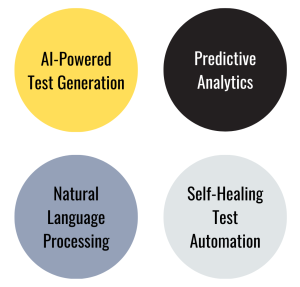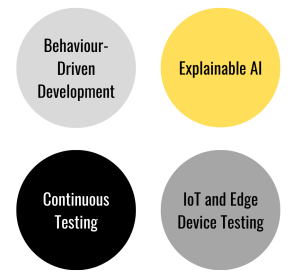Test Automation: Trends in Cognitive Testing
Introduction In an era dominated by digital transformation, the role of testing in software development has never been more critical. With businesses striving for innovation a...

Introduction
In an era dominated by digital transformation, the role of testing in software development has never been more critical. With businesses striving for innovation and agility, the demand for robust testing methodologies continues to soar. Traditional test automation has been instrumental in ensuring software reliability, but the emergence of cognitive testing represents a seismic shift in the testing landscape. As we delve into the future of test automation, let’s explore the intricacies of cognitive testing and the transformative trends shaping its trajectory.

AI-Powered Test Generation: Redefining Test Case Design
The advent of artificial intelligence (AI) has revolutionised test case generation, paving the way for automated creation based on sophisticated algorithms. By analysing vast datasets, historical test results, and codebases, AI-powered tools can intelligently craft test scenarios, significantly reducing manual effort and accelerating the testing process. This trend not only enhances test coverage but also ensures the validation of critical software functionalities, laying the foundation for more comprehensive testing frameworks.
Natural Language Processing (NLP) for Test Scripting
Natural Language Processing (NLP) is reshaping the way test scripts are written and maintained, democratising test automation and fostering collaboration among stakeholders. With NLP-powered tools, testers can articulate test scenarios in plain language, which are then automatically translated into executable test scripts. This seamless integration of human language and automation streamlines the testing workflow, enabling domain experts with minimal technical expertise to contribute effectively to the testing effort.
Predictive Analytics for Test Prioritisation
Predictive analytics, coupled with machine learning algorithms, is revolutionising test prioritisation by identifying high-risk areas within the application. By analysing historical test results, code changes, and environmental factors, predictive models can allocate testing resources intelligently, focusing on critical functionalities and potential points of failure. This data-driven approach optimises testing efforts, ensuring that resources are allocated efficiently to areas that pose the greatest risk to software stability and performance.
Self-Healing Test Automation
Traditional test automation frameworks often struggle to adapt to changes in the application under test or the testing environment. Self-healing test automation addresses this challenge by incorporating intelligent algorithms capable of dynamically adjusting test scripts in response to changes. These self-adaptive mechanisms ensure test scripts remain resilient and reliable, minimising maintenance efforts and mitigating the impact of changes on test execution.

Behaviour-Driven Development (BDD) with AI
Behaviour-Driven Development (BDD) practices emphasise collaboration between stakeholders to define and validate application behaviour through executable specifications. AI-powered BDD tools enhance this process by analysing user stories, acceptance criteria, and feedback to generate and execute test scenarios automatically. This alignment between business objectives and test execution ensures that software meets the intended objectives while promoting collaboration and transparency across development and testing teams.
Continuous Testing in DevOps Pipelines
As organisations embrace DevOps practices for accelerated software delivery, continuous testing becomes indispensable in maintaining product quality throughout the development lifecycle. Cognitive testing seamlessly integrates with DevOps pipelines, automating testing activities and enabling rapid feedback loops. By detecting defects early in the development process, continuous testing ensures that only high-quality code is deployed to production, thereby minimising the risk of post-release issues and enhancing customer satisfaction.
Explainable AI for Transparent Testing
The increasing adoption of AI-driven testing solutions necessitates transparency and accountability in test automation. Explainable AI techniques provide insights into how AI algorithms make decisions, enabling testers to understand the rationale behind test results. This transparency fosters trust in cognitive testing tools and empowers stakeholders to make informed decisions based on test outcomes, ultimately enhancing the reliability and credibility of the testing process.
IoT and Edge Device Testing
The proliferation of Internet of Things (IoT) devices and edge computing platforms introduces unique challenges in test automation. Cognitive testing solutions are evolving to support the complexities of testing diverse IoT ecosystems, including interoperability, security, and performance testing across heterogeneous devices. By leveraging AI algorithms to simulate real-world scenarios, testers can ensure the reliability and functionality of IoT applications in diverse and dynamic environments.
Conclusion
As we journey into the future of test automation, cognitive testing emerges as a cornerstone of software quality assurance, offering unparalleled capabilities in efficiency, accuracy, and innovation. By embracing these transformative trends and leveraging AI-driven technologies, businesses can navigate the complexities of modern software development with confidence, delivering high-quality products that meet the evolving demands of users and stakeholders alike. As we stand on the cusp of a new era in testing, the possibilities are limitless, and the journey ahead promises to be both challenging and exhilarating.